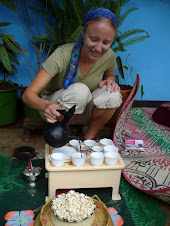Tonight I went out with my compoundmates to watch Manchester United and Aston Villa play in the third round of the FA Cup, at one of just a handful of local hotels with satellite television. Our hotel was packed with predominantly young Ethiopian men gathered to watch the game; both the restaurant area and a separate outdoor pavilion were filled to capacity. The first half of the game passed with no score, and as the second half began similarly, the ManU fans in the crowd began to get restless. Finally, late in the game, the TV cameras cut to a shot of Wayne Rooney hopping from the bench, stripping off his warm-ups, and preparing to enter the game. The ManU segment of the hotel crowd erupted into boisterous cheers for the Englishman, an Ethiopian fan favorite, and their roars were even later some twenty minutes later when he scored the second goal of the game, following Cristiano Ronaldo's first, to seal the ManU victory at 2-0.
In Ethiopia, football fandom is dominated by the English Premiership, and Ethiopian fans of the EPL give their loyalties, almost without exception, to either Arsenal or Manchester United. (Every once in a while, one will come across a scattered Chelsea fan or two, as well. I am told by my friend Mohammed that female Ethiopian football fans tend to favor Chelsea. He laughs as I ask him teasingly if this is the reason why he chooses to pull for the Stamford Bridge Club.) Ask the reason behind their chosen affiliation, and most people will give the obvious answer: Arsenal and ManU lead the League. Many Ethiopian football fans, especially those of Arsenal, will also cite the contributions of African players, a reason also noted by academics studying the phenomenal spread of the EPL's popularity in Africa. At least in Ethiopia, though, it is not the names of Adebayour (Togo), Toure (Ivory Coast), and Sanga (of Senegalese parentage) that are emblazoned on Arsenal posters and knock-off jerseys; nearly always, it is the name of the Spanish midfielder, Cesc Fabregas. Wall hangings of Ronaldo and Rooney - not Drogba (Ivory Coast) or Diouf (Senegal) - are sold in the marketplace beside those of Orthodox Saints Mariam and Markus. In partial explanation of this seeming discrepancy, merchandisers of the EPL have not yet begun to fully exploit their African fan base. In many ways, though, when it comes down to it, results are results, goals are goals, talent is talent, and the stars are those that can get the job done most often and consistently, in any culture and language.

No comments:
Post a Comment